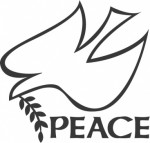
Prophet Muhammad's Methodology of Revolution
-
Seerah
- at 31 December 2009
THE Qur’anic verses revealed on Prophet Muhammadﷺ in the first thirteen years of prophethood in Makkah dwell heavily on one topic. Only the way of address, the syntax, style, and approach differed in accordance with the situation.
According to the Qur’an, the Oneness and Unity of Allah and subordination of human beings before Him and the relationship between the two are the most central issue of this Deen (Way of life) called Islam. The very foundation of this faith depends on this supreme ideology of Oneness and Unity of Allah.
Qur’an addresses all of humanity and does not view issues in isolation. Be it Arab or non-Arab, people of the period of the Prophet (pbuh) or those of later generations can benefit by its teachings in a similar way. There is no scope for amendment or dilution, and the meaning does not lose its essence with the passing of the age.
Fundamental Issue
The Qur’anic verses, especially those revealed in Makkah (before Prophet Muhammadﷺ’s migration to Madinah and establishment of an Islamic State), repeatedly stressed emphasis on the objective behind the creation of universe, the birth and existence of human beings, and the might of their invisible and omniscient Creator, who is keeping the whole system going. It also explains to the human being about his/her ultimate destination and life hereafter. The Qur’an also teaches us how to respond and behave to the universal nature. It talks of the mutual relationship among human beings. The very survival of humananity depends on the above discussed issue.
Those who wish to establish a system based on the teachings of Islam should pay special attention to the way the Qur’an addresses. In the first thirteen years of Makkah, the Qur’an did not dwell in great details on any other secondary issues, neither did it deem fit to explain the rules and laws, which were to be implemented in the Muslim society later on.
Early Period of Prophethood
At the very outset, the Prophetﷺ emphasized the Oneness of Allah: “La Ilaha Il-lallah†(There is no god but Allah). Apparently, it was not easy to explain this Dawah (message of Islam) to the Arabs. This was notwithstanding the fact that they fully understood the meaning of the Qur’an and its central message. They did not face any problem in grasping the very essence of “La Ilaha Il-lallah†(There is no god but Allah). They were well aware that Oneness of Allah stands for the establishment of the rule of Allah on the entire cosmos. This means that all the power will be seized from all the rulers, tribal chieftains, etc and returned to Allah. They were fully aware that only Allah’s wish will prevail on all walks of life.
The Arabs knew that the proclamation of “La Ilaha Il-lallah†(There is no god but Allah) was in fact a big challenge to the worldly powers. The supreme feature of Oneness and Unity of Allah is that it demolishes the sovereignty of all the so-called great and mighty. It is a revolt against all the rules, laws, and systems based on falsehood, fraud, and naked and brutal aggression. It is declaration of war against all the tyrants and autocrats of the world.
The message of this Dawah was not hidden from them, and they were conscious of what was in store for the self-made social and political structure. The revolutionary message for change prompted a large section of Arabs to heartily welcome this Dawah, and for this they resisted all the bitter opponents.
A question comes to mind: Why did Almighty Allah adopt the method of Dawah, which invited the anger of the opponents, and the Prophetï·º and his Companions had to face extreme hardship and ordeal?
Why No Slogan of Nationalism?
At the time when Mohammadï·º became the Prophet (the Messenger of Allah), the Arabs were passing through the worst phase of history. They were sandwiched between the two great powers. The Christian Romans in the north occupied Syria and Palestine, while the Persians, the followers of Zoroaster, grabbed the southern and eastern Arabian peninsula and reached as close as Yemen. For some years, even Syria and Palestine fell into the hands of the Persians. However, the Romans fought back and won this region from the Persians around the time of Battle of Badr.
The beleaguered Arabs were confined to Hejaz, Najd, and adjoining areas. All the fertile land of the region was in the hands of the two great powers of that age. The Arabs only had barren and deserted land in their possession. Those living in the northern and southern peninsula worked as subjects or slaves of Romans and Persians.
They were a leaderless nation, divided among themselves, and locked in a bitter struggle for supremacy. Even the regions of Hejaz and Najd were under the constant threat of the two great powers of the age. Just before the birth of Prophet Mohammad (pbuh), the Christian ruler of Yemen, Abraha, made an unsuccessful attempt to capture Makkah. His rout is well explained in the Makkan Surah, Al-Feel (The Elephant), named after his army full of elephants.
By the time he became Prophet, Muhammadï·ºwas the most popular personality of the Arabian peninsula. He was considered as Amin and Sadiq, that is, the most honest, truthful, and trustworthy person of the whole peninsula. People would share their problems and confide all the secrets to him. Fifteen years before the Prophethood was ordained on him, the warring Arabs made him arbitrator to solve the dispute related to Hajra-e-Asswad.
With so much people’s trust on him, this was the most opportune time for the Prophet to take up the leadership of the Arab nation. Heﷺ was the one man who could have united the warring tribes and restore confidence among them. The slogan of Arab nationalism would have been an instant hit. There would have been no murmur within, and everyone from tender children to elder folks would have loved to see him crowned as the undisputed ruler of the peninsular Arab.
Had he done so, he would not have had to pass through the ordeal, torment, and torture in Makkah for full 13 years. But why is it that Allah selected this hard way for his Messengerï·º? The real purpose of Allah was not to replace the power of Romans and Persians with that of the peninsular Arabs. The objective was to establish rule of Allah in the entire universe and not just change of regime.
Why Not Economic Revolution?
At the time of the arrival of Prophet Muhammadï·º, there was nothing like equal distribution and justice in the society. Wealth was concentrated in the hands of few. The rich traders were growing richer by adopting the policy of money begets money; that is, high interest. Exploitation was rampant everywhere in the region. In general, there was abject poverty, helplessness, and starvation. The minuscule affluent lot of the society would monopolize the so-called dignity and respect.
There was ample scope for an economic revolution. But why did Prophet Muhammadï·º not wage a war against the haves on behalf of the have-nots? Had he taken up this issue, the society would have divided into two, but the overwhelming majority would have fallen behind him. And thus, he would have been in the position to dictate his term.
In this case too, he would not have faced such a bigger challenge as he faced in championing the cause of “La Ilaha Il-lallah†(There is no god but Allah). It can be argued that by championing the cause of poor, he would have first forced the affluent class into submission and then compelled them to submit before Almighty Allah. But he was not allowed to adopt this short-cut strategy. Allah knew that this style was not suitable for the dissemination of Deen like Islam. Such problems can’t be solved in isolation but can be tackled only when the rule of Allah is established. Unlike the so-called struggles for economic equality here, in Islam both the givers and takers are aware of the presence of Allah, the One and Unique. The sense of reward in Hereafter works as wonder in solving the economic problem. And that is possible only when one has full faith in “La Ilaha Il-lallah.â€
Islam stands for total elimination of greed and envy. But it is also true that all the problems related to economy cannot be solved by sword or baton. There is no scope for force and coercion to implement so-called economic equality, which is creating more problem than solving it. A person’s self-will and generosity have great place in creating such equitable and just society.
Why No Movement on Moral Reformation?
There was serious moral degradation in the society at the time of Prophet Muhammadï·º Repression and tyranny was at its peak. Gambling and drinking were part of the life and fully appreciated by the society. Cases of adultery and rape were rampant. Exchange of wife was quite common. Polyandry and prostitution were not considered as crime, but in fact a sign of social standing. Bloodletting would continue for generations. Burying a girl child after her birth was never a crime.
Once again, a question arises: Why did the Prophetï·º not form a social reform organization and get rid of all the evils? Had he taken up this cause, a large section of people would certainly have come out to rally behind him, as there was no dearth of people who were fed up with the decadent society. It can be argued that this group would have taken up the cause of implementing Islam after fighting the social evils. But Allah did not command the Prophetï·º to take up this path, as Heï·º knew that moral change was not possible without strong faith in Allah. Any such reformatory movement would not have lasted long and would have little or no impact on the society. It is the fear of sin and sense of reward and punishment in the Hereafter that prevented the warring and criminalized Arabs from such ghastly and heinous crimes.
The Revolution
The message of Oneness and Unity of Allah sank deep into the hearts of the true followers of Islam, and they exhibited enormous perseverance against great torment and hardship. The rule of Allah liberated them from the tyranny of man on man. The slogan of “La Ilaha Il-lallah†completely overhauled and transformed the society.
The entire region was cleared of Romans and Persians. But that was not the sole objective, nor was the goal to replace them by the rule of Arabs. All those who rebelled against the rule of Allah, be it the Romans, the Persians, or even the Arabs were consigned to the dustbin of history. In this Islamic rule, the Supreme Justice of Allah finally prevailed. Here everything was weighed on the balance of right or wrong, good or evil, truth or falsehood, etc. Tauhid (Oneness of Allah) was the foundation of this collective justice, and it was termed as Islam. Apart from that no other name was tolerated for this faith, “La Ilaha Il-lallah†was inscribed on its foundation plaque. This slogan of “La Ilaha Il-lallah†changed the very personality of all those who embraced it --Arabs or non-Arabs, Blacks or Whites, etc.
How This Revolution Took Place?
This huge revolutionary transformation was possible only after those championing this cause underwent a complete change of heart. Unlike other movements of the so-called total change, the Qur’an first demands the people leading this cause to transform himself or herself completely. In the absence of such change, the rule of Allah can never be established by them.
So the same ever fighting, corrupt, and disintegrated Arabs emerged as the most ideal and unified community of the world. And these qualities were not only monopolized by them, but also all those who embraced them underwent the same change. This is possible only when there is a sense of reward in Hereafter and full faith in “La Ilaha Il-lallah.â€
This task of establishing the rule of Allah was possible only after the Prophetï·º and his Companions had passed through all the ordeals and hardship. They were reared and trained for this great cause. There was no national pride left in them, nor was there any tribal bias. The supremacy of family vanished. It was only after they acquired these qualities that the same Arabs set out to establish the Khilafat-e-Aarzi, the permanent rule of Allah. They resisted and fought for this supreme cause and even laid down their lives. Allah recognized these qualities, and they became the best custodians of Shariat Ilahi (the rule of Allah). There is no monopoly of any nation or community in establishing any such system.
The rule of Allah would never have been established had those championing the cause not passed through the ordeal and test. Had this movement made any compromise with “La Ilaha Il-lallah†and included other slogans, then this system would never have emerged.
Written by Syed Qutub Shaheed (ra). Translated and Condensed by Soroor Ahmed.
Recent posts
-
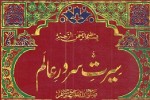
The Miracles of Prophets -2
17 May 2019 -
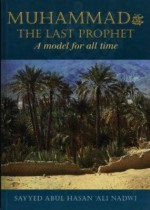
Muhammad The Last Prophet a model for all time
08 March 2019 -
Muhammad The Guide of Mankind
08 March 2019 -
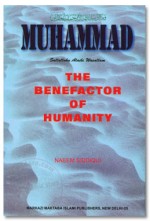
Muhammad (pbuh): The Benefactor of Humanity
08 March 2019 -
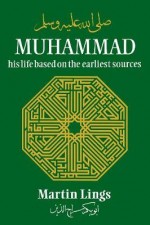
Muhammad his life based on the earliest source
08 March 2019 -
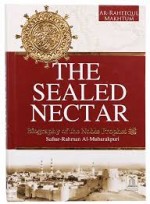
The Sealed Nectar
08 March 2019
